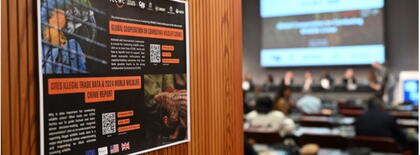During its meeting in Vienna, from 11-15 April 2011, the United Nations’ Commission on Crime Prevention and Criminal Justice adopted a Resolution on “Crime prevention and criminal justice responses against illicit trafficking in endangered species of wild fauna and flora” which was proposed by Chile, Costa Rica, Guatemala, Mexico and the Philippines.
 |
| Organized criminal networks are known to be involved in the poaching of rhinoceroses, as one example of illicit trafficking in endangered species. |
The Resolution (full text attached) expresses concern about the involvement of organized criminal groups in the trafficking of endangered species, recognizes the work being conducted at international levels, for example by the recently-established International Consortium on Combating Wildlife Crime (ICCWC), and urges the Member States of the United Nations to strengthen international, regional and bilateral cooperation. The Commission also invites States to make trafficking in endangered species a serious crime and requests the United Nations Office on Drugs and Crime to provide assistance in combating such crime.
John E. Scanlon, Secretary-General of CITES, said, “Although the United Nations Commission on Crime Prevention and Criminal Justice has previously acknowledged the serious level of crime associated with the illegal trade in endangered species, this Resolution could not be clearer in recognizing the involvement of organized criminal groups in illicit trafficking of fauna and flora. And I’m delighted that our partner agency, the United Nations Office on Drugs and Crime, with which we are already collaborating very closely, has been provided with a strong mandate to continue its efforts in helping countries to combat such crimes.
We now hope that the Member States of the United Nations will respond to the Commission’s call that more must be done to bring to justice the criminals who are daily robbing countries of their natural resources.
The Resolution also reflects the wishes of the CITES community that its enforcement officials receive support, and capacity building, with regards to the prevention, investigation and prosecution of illicit trafficking in endangered species.
We take great satisfaction from the Resolution’s recognition of the work being done by the ICCWC, which is in the process of finalizing an agreed programme of activities. Perhaps most importantly, though, the Commission has demonstrated that the international law enforcement community and policy-makers believe, as we do, that wildlife crime is just as much a part of ‘mainstream crime’ as the trafficking of narcotics, arms and humans and warrants a similar determined and coordinated response.”
See also:



